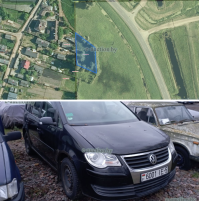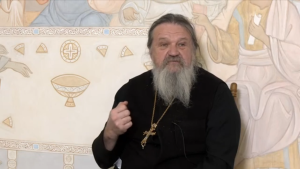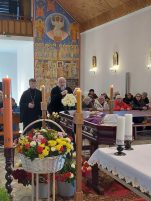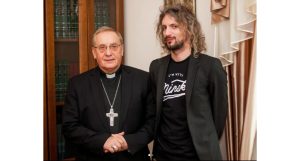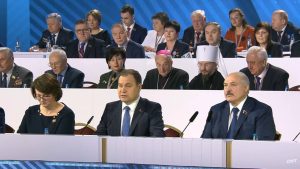Persecution of the Catholic Church, Clergy and Laity in Belarus
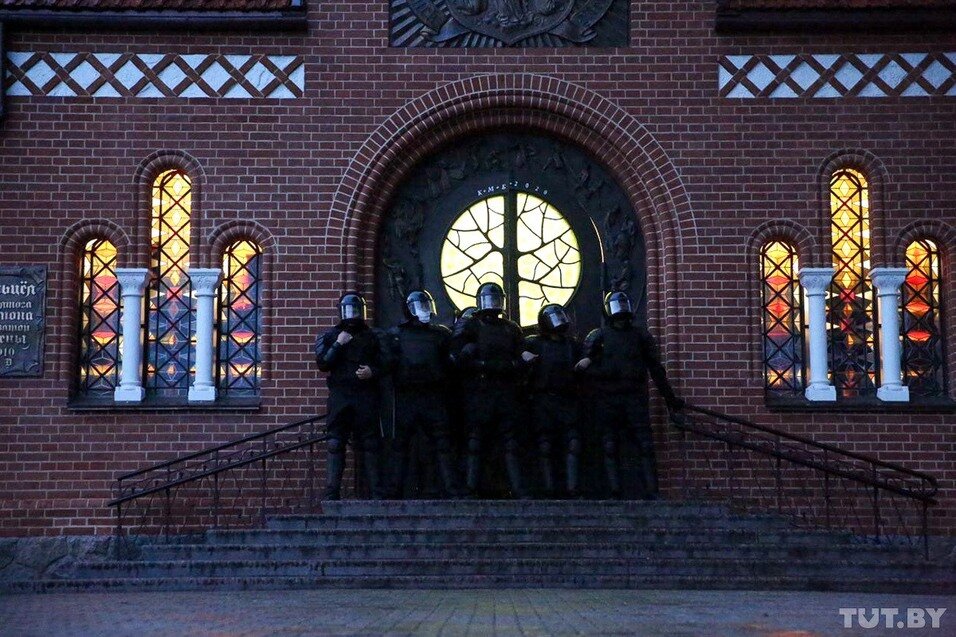
In the course of the political crisis in Belarus, the Catholic Church, its communities, clergy and faithful — both Roman Catholics and Greek Catholics — faced persecutions on account of their religious and civil activities: martyria — witnessing the truth of Christ’s teaching; diakonia — offering care to the persecuted; leitourgia — praying and worshipping.
Administrative persecutions, arrests, fines, searches
During the presidential elections campaign in Belarus, Catholics advocated for fair elections. Artiom Tkaczuk, a Roman Catholic activist, a member of the family movement, was one of those who launched a campaign “A Catholic does participate in stealing elections”. It aimed to remind Catholics that manipulating people’s votes, even if done under the authorities’ duress, is a grave sin. This campaign of moral rather than a political nature was supported by many parish priests in Belarus to encourage and empower the members of electoral committees to abstain from participation in rigging the elections.
During a protest rally in October 2020, Tkaczuk and his Evangelical Christian friend, Zmitser Dashkevich, raised a banner with the words “Let My People Go!”. The appeal referred to the Book of Exodus and the prophet Moses’ demand for the Pharaoh to release the chosen people from slavery. Tkaczuk is the father of two little daughters; he pleaded to be fined, however, the judge imprisoned him for twelve days.
There were also other Catholic activists arrested during peaceful protests. Marina Bulatovskaya, a Greek Catholic from Viciebsk, prayed the rosary with her friends in close proximity to a peaceful march. She was fined. Andrey Luhin and Aliona Palachanskaya of a Christian music band Laudans were arrested for 15 days. They were punished for playing a concert in front of several dozens of people in one of the Minsk neighbourhoods. Maksim Kavaleu was sentenced to 15 days of arrest for mourning — lighting a candle and praying at Plošča Pieramien (Square of Transformations) — for the allegedly murdered Roman Bondarenko. Alla Roshchynskaya, a Catholic from Viciebsk, was sentenced to ten days of arrest on a similar occasion. A 74-year-old Greek Catholic Barys Khamaida from Viciebsk was fined for holding a gonfalon with the embroidered text of the Our Father prayer. The gonfalon was made by another Christian, Antanina Pivanos. A 65-year-old Roman Catholic Maria Revutskaya was detained for one day after leaving the Cathedral of the Blessed Name of the Virgin Mary in Minsk where she had sung in the choir during a solemn Mass to celebrate Archbishop Tadeusz Kondrusiewicz’s 75th anniversary. On the way, in rain, Revutskaya held an open umbrella of white and red colours of the Polish flag and the word Polska (i.e. Poland). On the following day, she was fined: an anonymous witness insisted that Revutskaya had swung an umbrella in her hands. The KGB broke into and searched the apartment of Ruslan Tashtimirov, a Roman Catholic activist, the father of ten children and the founder of a Viber-based prayer group, The Scripture for Motherland. Flags, a computer and a phone were seized, and Tashtimirov was detained. He was interrogated, forced to sign a nondisclosure agreement and released.
Two Catholic journalists faced persecution. Ihar Baranouski from Brest, the editor of the Greek Catholic newspaper Carkva (Church), is undergoing an administrative investigation for sharing on social networks the links to several publications of the TV channel Belsat labelled as extremist by the Belarusian authorities. Dzmitry Lupach, a Hlybokaje-based journalist of a Catholic newspaper Katalicki Viesnik, was detained together with other five persons as a suspect in a criminal case for allegedly posting in one of the Telegram chats an anonymous video that contained calls to violence against the law enforcement agencies.
Imprisonment, tortures, violations of freedom of religion
Several Catholic believers have become political prisoners and/or faced tortures and inhuman treatment; their right to freedom of religion or belief was restricted and violated in custody.
A Roman Catholic Vitaly Shatalau was detained and particularly severely beaten for being a believer. Following the beating, he was hospitalised. He was identified by the police as a believer by multiple religious tattoos on his body, incl. a crucifix on his back and an image of St John Paul II on the inside of the elbow.
Another Roman Catholic, Vitold Ashurak, an activist of the Lida Catholic community, was tortured to death on 21 May 2021. He died under unexplained circumstances in the penal colony no. 17 in Škloŭ. Ashurak had been tried in secret and sentenced to five years of imprisonment on 18 January 2021. His body was released to relatives, it had multiple injuries. Ashurak was arrested in 2020 with a rosary in his hand when he was returning from a rosary prayer.
A Greek Catholic Dzianis Ivashyn, a journalist, had a heart attack in a standing cell in prison no. 1 in Hrodna where he was detained for his investigations.
A Roman Catholic Mikita Yemialyanau sentenced to a maximum-security colony term is facing ongoing restrictions of his freedom to practice faith in prison no. 4 in Mahilioŭ. He is not allowed to subscribe to the Katalicki Viesnik newspaper and his requests for pastoral visits were denied. In October 2021, Yemialyianau was placed into a punishment cell for twenty days for alleged violation of the rules of the prison’s internal order. He went on a hunger strike protesting against the ban on priest visits. Finally, a pastoral visit took place at the beginning of November. Yemialyianau received the sacraments of confession and communion from Bishop Aliaksandr Yasheuski SBD, however, the rosary provided by the bishop was immediately confiscated.
Detention, imprisonment, torture and deprivation of the freedom of religion or belief of Catholic women are common too. Since 18 March 2021, Volha Zalatar, a mother of five children and an active Catholic believer, was held at the pre-trial detention centre no. 1 in Minsk. She was accused of creating an ‘extremist group’ — a web-based neighbourhood chat. 70 Catholic priests petitioned the investigative committee to drop Zalatar’s criminal prosecution. Two priests, including Zalatar’s parish priest, Fr Alexandr Famianych, submitted sureties for changing the measure of her restraint. The trial of the believer lasted from 15 November to 3 December 2021 in the Minsk city court. In her final speech, Zalatar stated that all her words and actions were motivated by nothing but her belief, the desire to follow the commandments of God and make the world be like the Kingdom of Heaven: “All my actions and statements are determined by love towards people and by hatred ‑ towards lies and violence.” On 3 December 2021, Zalatar was sentenced to four years in a general regime prison.
Volha Zalatar reported being subjected to torture and violence during her arrest on 18 March 2021 and during interrogations. Zalatar’s lawyer, Andrey Machalau, testified that he had personally witnessed the signs of torture on the woman’s body: bruises on arms, neck and buttocks. Following the allegation of torture, the lawyer’s license was annulled.
Zalatar requested a pastoral visit on several occasions, but all her requests were rejected. Only on 2 June 2021, the Apostolic Nuncio in Belarus, Archbishop Ante Jozić, was able to visit Zalatar in the pre-trial detention centre.
Together with other members of the Mothers in Prayer community, Irena Bernatskaya, a Roman Catholic from Lida, initiated a prayer for Belarus in the form of the Pompeian novena, a rosary devotion lasting for 54 days. The prayer took place in front of the Farny Church of the Exaltation of the Holy Cross in Lida, Hrodna region. In October, the Lida district court found Bernatskaya guilty of violating the procedure for holding mass events and fined the believer. On 25 March 2021, Bernatskaya was accused of allegedly inciting hatred. She was detained and held at the pre-trial detention centre no. 1 in Minsk. She requested a pastoral visit on at least two occasions, but all her requests were turned down. On 25 May 2021, Bernatskaya was forcibly expelled to Poland.
Persecution of priests and bishops
Several Catholic priests were persecuted in connection with protests; they were detained, tried, arrested or fined:
- Roman Catholics: Fr Eduard Sinkevich SCJ (Pastavy), Fr Alexander Fedotov SCJ (Hrodna), Fr Dzmitry Prystupa SCJ (Liachavičy), Fr Jerzy Wilk, Fr Viktar Zhuk SJ (Viciebsk);
- Greek Catholics: Fr Igor Kondratyev (Brest), Fr Vitaly Bystrou (Brest), Fr Aleksey Voronko (Viciebsk).
The most notable case of persecution of priests is the one of Fr Viachaslau Barok, a parish priest from a small town of Rasony, Viciebsk region. Fr Barok is a popular blogger preaching on Christian social teaching and its relevance to daily life and discussing the socio-political crisis in Belarus in the light of the social teachings of the Catholic Church. Persecutions against him began in November 2020 when his YouTube channel was examined by the authorities. The investigator referred Fr Barok’s vlog and Instagram posts to a linguistic examination to identify the calls “aiming to incite extremism and harming the national security of the Republic of Belarus”. On 1 December 2020, a court hearing Fr Barok’s charge of violating article 17.10 of the Code of Administrative Offences — “propaganda and (or) public display, production and (or) distribution of Nazi symbols or paraphernalia” — began. The prosecution alleged that Fr Barok had committed a crime by reposting on Instagram the Stop Lukashism! work by a well-known graphic artist, Vladimir Tsesler. On 3 December, Fr Barok was sentenced to ten days of arrest. On 29 January 2021, he was again summoned to the investigative committee office and told that nine new examinations of the eight videos had been initiated.
In June 2021 Fr Barok reposted on his Instagram a photo featuring children with a banner “SOS! My motherland is in great trouble!”. The children were Belarusian refugees in Poland. Their parents, Antanina Kanavalava and Siarhei Yarashevich, are political prisoners in Belarus. Children had left the country with their grandmother to avoid being placed in an orphanage. Fr Barok was summoned to the police. He was informed of the prosecutor’s permission to search the church, parish hall, and the priest’s house; and to seize all the equipment and data carriers in order to disrupt the priest’s preaching on the internet. Fr Barok’s smartphone was seized during the questioning. He was also informed of the prosecutor’s formal warning in relation to the extremist materials allegedly posted on the priest’s social networks. Fr Barok left Belarus on 5 July 2021 and now lives in Warsaw providing pastoral care to Belarusian refugees and continuing his missionary work on the internet.
Raising voice for justice, rule of law and human rights: persecution of bishops
One of the first Catholic leaders to condemn violence and call to dialogue and justice was Archbishop Tadeusz Kondrusiewicz. After his call for dialogue on 11 August; an appeal to the state authorities “to start a constructive dialogue with the society, stop the violence and release all innocent citizens detained at peaceful rallies” on 14 August; the meeting with the Minister of Internal Affairs, Yuri Karaev, concerning the law enforcement agencies’ unrestricted violence against civilians, Archbishop Kondrusiewicz was banned from returning to Belarus on his way from Poland. Such a ban was illegal: it violated international agreements, the constitution and legislation of Belarus. It was intended to intimidate the religious leader personally and the whole religious community.
On 4 September, Lukashenko commented on the situation with Archbishop Kondrusiewicz. He accused him and the entire Catholic Church in Belarus of working against the state. Only after a series of the Holy See’s diplomatic steps, Archbishop Kondrusiewicz was able to return to Belarus on Christmas Eve, 24 December 2020. Almost immediately, on 3 January 2021, on the day of Archbishop Kondrusiewicz’s 75th anniversary, Pope Francis accepted his resignation due to reaching the retirement age.
The Auxiliary Bishop of the Minsk-Mahilioŭ Roman Catholic Archdiocese, Jury Kasabucki, was persecuted for his moral stance. On 18 November 2020, along with the press secretary of the Belarusian Orthodox Church, Fr Sergy Lepin, he was summoned to the prosecutor general’s office. Bishop Kasabucki and Fr Lepin were given written warnings regarding their Facebook posts in which both had criticised the authorities for vandalising the people’s memorial for murdered Roman Bondarenko. This was preceded by Lukashenko’s request to curb clergy’s activism. On 24 November, Lepin and Kasabucki were summoned to the investigative committee again. They were informed that their social network posts were undergoing a linguistic examination. The results of the examination would determine whether a criminal investigation could be initiated.
Parishes, church-related organisations, liturgical life and the whole Catholic community under threat
At least three Catholic parishes have experienced pressure.
The Greek Catholic parish of St Brothers Apostles Peter and Andrew in Brest received a warning from the Brest regional executive committee threatening the parish with closure by court order due to the parish priest’s activities. On 16 August 2020, Fr Igor Kondratyev spoke to the meeting of protesters attended by thousands of people. He called for the release of the detained and severely beaten protesters. Fr Kondratyev also gave interviews in which he discussed moral and ethical aspects of the situation in the country.
The Greek Catholic parish of Žyrovičy Mother of God in Ivacevičy received a formal warning in relation to “the priest’s participation in unauthorized events”. This followed the ten-day arrest of Fr Vitaly Bystrou sentenced on 30 November 2020 in Brest. Fr Bystrou lives in Ivacevičy but does not belong to the local parish clergy.
The entry to the Roman Catholic church of St Simon and St Helena (Red church) in Minsk was blocked on 26 August 2020 during the dispersal of protesters at Plošča Niezaliežnasci (Independence Square). This created an obstacle for the activities of this parish community. On 31 August, the state authorities replaced the door locks of this church without the community’s permission. On 11 September 2020, another brutal detention of women took place by and inside the Red church at Plošča Niezaliežnasci (Independence Square) in Minsk by masked riot police.
Since March 2021, Roman Catholic parishes throughout the country have been subjected to inspections related to the beginning of the criminal prosecution of the Union of Poles, an NGO. Local prosecutor’s offices and the departments for ideological work of local authorities — on instruction from prosecutor’s offices — demanded reports, plans of catechetical instruction and other information about parish activities from the clergy. In an interview with the pontifical foundation Aid to the Church in Need (ACN), the Head of the Conference of Catholic Bishops of Belarus, Bishop Aleg Butkievich, said that the authorities had increased the control over the activities of some priests and parishes due to the ongoing political crisis.
The state authorities undertook other hostile acts towards the Roman Catholic community in Belarus. As early as August 2020, Catholics were deprived of broadcasts of the Sunday Mass from the Roman Catholic Archcathedral. This was particularly hurtful in the situation of Covid pandemic as for many faithful the radio broadcasts were the only possibility to participate in a Sunday Mass. Allegedly, the Belarusian national radio terminated the broadcasts for technical reasons; the fault has never been identified, however. Bishop Jury Kasabucki alleged that the abrupt termination of the broadcasts was intended to intimidate the Roman Catholic Church. The broadcasts have not yet resumed.
On 7 August 2021, the newspaper of the Minsk regional executive committee, Minskaya Prauda, published a caricature of Catholic priests on its front page. It pictured them with a swastika instead of pectoral crosses; one was holding a white-red-white Belarusian flag under his arm while performing the Mahutny Boža (Almighty God) hymn. This caricature of Catholic priests had the signs of deliberate defaming the Roman Catholic Church in Belarus, promoting a negative image of Catholic priests as ‘Nazis’, and inciting religious hatred and discord towards Roman Catholic clergy. Anti-Catholic propaganda is common in the Belarusian state media and among the Lukashenko regime’s representatives. The Media IQ project studying state propaganda published an analysis of anti-Catholic defamatory narratives from March to August 2021 and cited a number of such examples.
Charity work of the Catholic Church in Belarus is restricted. In February 2021, Caritas, the charitable society of the Roman Catholic Minsk-Mahilioŭ Archdiocese, was prevented from receiving foreign funding for providing the poor with livestock, plant saplings and food. Permission from the Department for Humanitarian Affairs at the Belarus President Property Management Directorate is mandatory for accepting foreign donations. This refusal to permit foreign assistance for a Catholic organisation has signs of intimidation of the religious community by the Belarusian state authorities and preventing the community from performing its diaconic mission.
Even liturgical life is under threat. In particular, it concerns the Mahutny Boža (Almighty God) hymn, a traditional liturgical song performed at Roman and Greek Catholic and many Orthodox parishes in Belarus and in the diaspora. A church music festival in Mahiloŭ attracting choirs of various Christian denominations has its name too. The lyrics of the hymn was written by Belarusian poetess Natallia Arsiennieva in 1943. Its music was composed by a church composer Mikoła Ravienski in exile after World War II. The hymn became one of the most favourite songs of the Belarusians scattered around the world. It has a form of prayer in which God is asked to bless people in their daily work and life and to make the country and the nation free and happy. The hymn became popular during the peaceful protests of 2020. It was often performed at flashmobs at various public spaces.
In 2021, for the Day of Republic celebrated on 3 July, the state authorities urged religious communities to hold a prayer for national unity. Some communities were instructed to do it by their bishops or local authorities. In response, the curia of Minsk-Mahilioŭ Archdiocese suggested praying for unity and peace in the country concluding the Holy Mass with the Mahutny Boža hymn. The day before, Lukashenko issued a threat to Catholics not to sing it. Due to this intimidation, for the first time since 1990 Mahutny Boža was not sung at any of four public Masses of the annual pilgrimage at the Marian shrine in Budslaŭ.
Conclusion
All these cases demonstrate that the Catholic community in Belarus, its parishes, clergy, laity and church-affiliated organisations experience attempts to control them, persecutions, threats, intimidations, tortures, restrictions of freedom of religion or belief and of other rights. Other Christian communities experience hostility from the Belarusian regime too. The Christian Vision Working Group monitors relevant cases of persecution of all Christian communities and individuals; the account of persecution can be found in the regularly updated monitoring.




